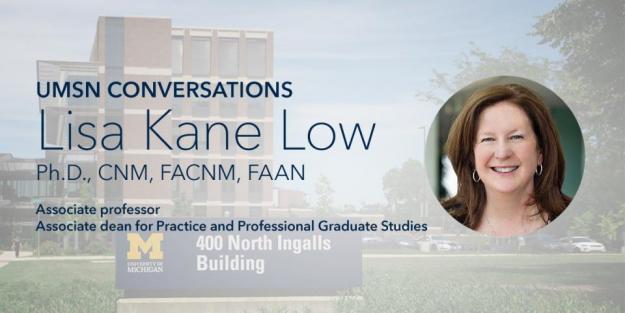Leadership insight: Q&A with Lisa Kane Low

 Dr. Kane Low, Associate Dean for Practice and Professional Graduate Studies, sat down with Jaime Meyers to discuss her vision for advancing UMSN’s graduate programs and enhancing opportunities for practice collaborations.
Dr. Kane Low, Associate Dean for Practice and Professional Graduate Studies, sat down with Jaime Meyers to discuss her vision for advancing UMSN’s graduate programs and enhancing opportunities for practice collaborations.
Jaime Meyers (JM): Your role is a new one that was created to fit the school’s changing needs. What are some of the challenges that come from developing a new position?
Lisa Kane Low (LKL): When the position was first launched it was done with one configuration in mind. At the time, graduate programs were in U-M’s Rackham Graduate School and there was a student services office at UMSN that handled those student needs.
We moved our programs out of Rackham which means this office had to do more in terms of student programming and the curriculum. We’ve also taken on graduate student services, so there’s been a lot of growth in the program management side.
The other side of the role is growing and bringing the faculty practice piece in alignment with the program development to support student education. That hasn’t grown as much because of the growth on the program side. The future opportunity is to grow the practice side and bridge those areas.
JM: You’re also the president of the American Colleges of Nurse Midwifery—a very influential and prestigious role in midwifery. How do you balance those roles? And, how does the work you do for the ACNM and UMSN benefit one another?
LKL: That’s been really challenging because when you take on a new role, you try to anticipate what the workload and synergies will be, but you don’t really know. The amount of time I’m spending in what is a volunteer role is pretty high. You’re assumed to be on call and available 24/7.
That said, there are nice synergies and I’ve had the opportunity to be part of national conversations around interprofessional education, advanced practice nursing and barriers to full practice authority, trends in health care, workforce development and preceptor development.
In those ways, it’s been really beneficial to find ways the ACNM work can intersect and benefit what we’re doing at the school. And I’ll be able to maintain many of those relationships with national decision makers even when I’ve completed the leadership role at ACNM.
JM: How does UMSN’s emphasis on diversity, equity and inclusion impact your role?
LKL: We’re always thinking about the ways our programming can be more inclusive, how you support a more diverse student population, and supporting various needs across a wide spectrum. For graduate students, you need to think about the demands of their employment and being a student at the same time, and having a school and family balance. We’ve put a lot of thought into those structural pieces but we have a lot more growth to do on the student support services side, fostering a sense of inclusivity in our classrooms and how we design our programs. We’ve had really good staff participation in different committees to come up with strategies to move those ideas forward.
JM: What is the most rewarding part of your job?
LKL: What I enjoy the most is bringing together a group and problem solving something that improves a situation. It’s taking on a challenge and finding a creative solution that leaves everyone walking away feeling that we’ve made something better. A lot of our recent work has been in student services. We’ve looked at how we function, how to create a seamless experience for students and how that works across departments. I really enjoy the creative process that comes from having a group of people around the table and giving input to problem solve and get solutions. Regardless of the topic, it’s the process I enjoy.
JM: You were a BSN and Ph.D. student at UMSN. What are some of the experiences or lessons you’ve carried with you to your role as faculty?
LKL: I’ve often say I bleed blue. I I’ve got this sense of pride from being a Michigan graduate. Both of my kids graduated from Michigan.
There’s something that I feel like I took away from my student experiences that positioned me to be in a leadership role. Very early on in my career, I led a midwifery service and I felt like I was constantly calling on things I learned on my undergraduate management course. At the time, as a student, you’re just thinking of graduating and taking care of people, but I felt like I was instilled with this sense of potential for the future.
I think we continually reinvent what future leaders need in their education to take on challenges and feel like you’ve got a solid foundation from which to build. As a school we do that, and as an individual, I feel like I’ve gained from just being in that culture and environment throughout my career.
JM: If you couldn’t be a nurse, what would you do?
LKL: I’d stick with something in service and policy. Nursing builds on perspectives of holistic care and social justice, so I’d stick with getting a nursing degree. If you went on to something else, like law or public policy, you can build on your nursing foundation. It’s a great launching pad.
JM: If you could do the role of any UMSN staffer for a day or had the chance to learn more about a UMSN department, what would it be?
LKL: One of the exciting parts of this role has been getting to know some of the different departments and the scope of the work that others do. I’m interested in seeing how the project management team is going to move forward. It’s exciting to think about seeing bigger projects in a coordinated way. Mary Fallert, a project specialist in the dean’s office, sees so many different roles and how those things intersect. It’s not so much that I want to do it (laughs), I want to have the results! The more that you can do to bring coordination and efficiency helps everyone feel like we’re all in this together.





